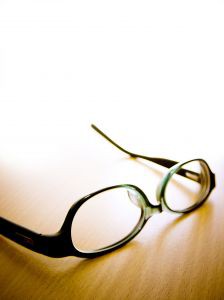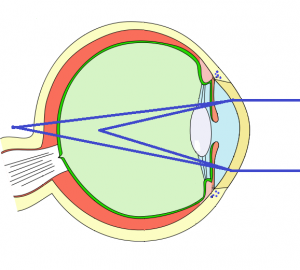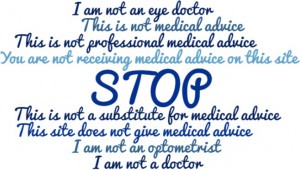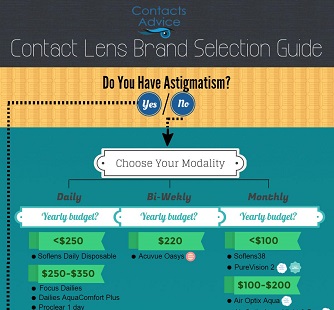There are many myths surrounding the use of contact lenses. Most are unfounded but nonetheless, they can get into people’s heads and prevent them from wanting to try contact lenses. One of these myths, which many parents use to tell their teenage children that they can’t wear contact lenses, is that contact lenses makes your vision worse. In this article, I will do my best to dispel this myth.
I am not a doctor. The information provided on this page is for general educational purposes only. You are not receiving medical advice or being given a diagnosis on this page. Please read Contacts Advice Terms of Usebefore continuing.
Let’s clarify what we mean by ‘vision’
In order to tackle this topic, let’s first start by clarifying two things. There is a difference between our vision and our prescription for glasses/contacts.
- Our vision, technically referred to as our visual acuity, is a measure of how well (how much detail) we can see. This is the number that is a denoted as something (a number) over 20. I.e., 20/20 is perfect vision.
- There are two more concepts that are important to clarify. When it comes our visual acuity, anyone with a prescription for glasses or contacts has two vision measurements. They are
 called the ‘unaided visual acuity’ (UVA) and the ‘best corrected visual acuity’ (BCVA).
called the ‘unaided visual acuity’ (UVA) and the ‘best corrected visual acuity’ (BCVA).
- UVA is how well one sees without any help from glasses or contacts.
- BCVA is the best possibly vision that one can achieve with glasses.
- So for example, someone with nearsightedness who’s glasses prescription is -4.00D in both eyes, will have poor UVA (wtihout their glasses) but excellent BCVA (with their glasses).
- There are two more concepts that are important to clarify. When it comes our visual acuity, anyone with a prescription for glasses or contacts has two vision measurements. They are
- The numbers in your prescription for glasses is not a measure of your vision, but of the strength in the lenses required to make your vision as good as possible. I.e., -2.50, +1.50/-0.75 x 180 etc.
So what about the myth that contacts makes your vision worse?
Let’s see how the claim that contact lenses makes your vision worse applies to the vision principles we discussed above.
Changes in our prescription

When I have people tell me that they don’t want contacts for their kids because it will make their vision worse, I think what they are saying is that contact lenses will cause their prescription for glasses to get stronger. This is not true. Our prescriptions for glasses gets worse because of changes in the shape of the eyes. This can be changes of the overall length of the eye which creates either nearsightedness or farsightedness, or changes to the curvature of the cornea which can create astigmatism. There are two main factors that can determine the shape of the eyes, and thus our prescriptions for glasses.
- Our genetics. If one or both parents are near-sighted, the chances that their children will be near-sighted increases.
- Near point/accommodative strain. This is a term used to describe what happens to the eyes when they are focusing on things too closely, for too long.
In most people, these changes will take place predominantly in the pre-teen and teenage years, and tend to stabilize in the early twenties. You will notice that nowhere in this discussion did contact lenses come up. The use of soft contact lenses does not have an impact on the overall length of the or the curvature of the cornea, therefore does not makes one’s prescription worse.
UVA
Unaided visual acuity depends on your prescription for glasses. Typically, the higher the prescription is, the lower the UVA. But since contact lenses do not cause any changes in the number in the prescription, it follows that they do not have any effect on the UVA.
BCVA
The best corrected visual acuity is the highest potential for the eyes to see. For most people, the BCVA is 20/20, meaning that with glasses or contacts they should be able to see 20/20. The BCVA depends on the health of the eyes. In order to have a BCVA of 20/20, the eye’s ocular media must be clear (i.e., the cornea, the aqueous humor, the crystalline lens, the vitreous humor), and the retina, optic nerve, optic pathways, and visual cortex must all be well developed and healthy.
Contact lenses do not affect the health of any of the structures mentioned above except the cornea. The only instance in which contact lenses can make your vision worse is if they cause the cornea to become less clear. This can happen if the contact lenses cause chronic dryness of the eyes, if the contact lenses do not fit properly, or if contact lenses lead to an infection of the cornea that leaves behind a scar. All of these things can generally be avoided with proper care of the contact lenses and routine eye exams.
Final Verdict
Although the language surrounding the myth is vague, it does not apply to most definitions of how we colloquially use the term ‘vision’. It is possible for contact lenses to make your vision worse, but the main determinant for that to happen is not the contact lenses themselves per se, as the myth would imply. The vast majority of contact lenses wearers do not encounter this issue. Rather, the main determinant is how responsible the wearer is with the contact lenses when it comes to wearing schedule, replacing them on time, cleaning & disinfecting the lenses, avoiding activities that are restricted for contact lens wearers, etc.
So don’t believe everything you hear out there. Contact lenses are great but they are medical devices and need to be taken seriously as to avoid any complications. I hope you found this information helpful! I’d love to hear what your thoughts are on this topic and I look forward to reading them in the comments section below.





21 Responses
Emily
hi!
As a long time contact lenses wearer I am happy to read your post! I had heard the same myth as well as “if you wear your glasses too often your eyes will become weak”. I am very thankful for my contacts as my prescription is around -10…..But I think you got a good point that the care of a wearer with their contacts and schedule and regimen is very important. I take mine out every day and take care of them. In over 20 years of wearing them, I never had any issue
Julie
Emily, 20 years? That’s fantastic! And I thought I was seasoned wearer! I was up to 13 years when I stopped wearing them due to having had LASIK. Thanks for sharing your story, and here’s to 20 more years of successful contact lens wear, cheers!
Peter
Hi. Although I don’t wear contacts myself, I know plenty of people who do. In fact, only the other day I was talking to a close friend who was worried about the long term implications of wearing contact lenses. Your article is clear and intelligently written and I’ll pass on your URL to her, I’m sure she’ll be delighted!
Peter
Julie
Hi Peter!
Thanks, I appreciate that a lot! :)
Tracy
I have always wondered if contact lenses make your vision worse. I got my answer. Thanks for sharing this post with us
James
Great article. I have often thought about getting contacts but was to worried about all the myths. I might give them a try now :)
Julie
Hi James,
There’s a lot of scary stories going around, but unfortunately a lot of them are misinformed. And it seems that it’s always the most horrible ones that get spread…
I hope you decide to give contacts a try :)
tony
Nice article and users with young kids that where contacts need to read. Contacts lenses can make your vision worse if the lenses are not care for properly. Kids these days are more into those color lenses and often buy them from their local corner store without medical advice.
Julie
Hi Tony,
You’re right, I see a lot of stores selling color contact lenses from overseas that I have never heard of before, and that I highly doubt have ever passed any sort of safety standards here in North America. I do not recommend these lenses and that is why I only discuss lenses of the highest quality here on this site. Health is the top priority. Thanks for your comment! :)
Michelle
Hi Julie. I have worn glasses most of my life and have recently decided to see about getting contact lenses. I had not heard the myth about contact lenses, but it really makes no sense to me! I’m looking forward to trying out contacts in a couple of weeks and am glad I came across your website. You’ve got a lot of helpful information that I am enjoying learning about before I get my own contacts!
Julie
Hi Michelle!
That’s very exciting! I know you will do well in contacts. Let me know how things work out! Thanks for the comment :)
Chris Towers
My wife has the need to wear contact lenses due to a minor problem with her eyesight. Although i must say she wears normal glasses to work and the contact lenses for home and in her free time.
The only problem she has ever had with contacts is when people smoke around her and it goes onto the lenses. It causes a lot of pain. Apart from that she says everything else is perfect.
Thanks
Chris
Julie
Hi Chris!
Not only does cigarette smoke make wearing contact lenses uncomfortable, but it also significantly increases the chance of getting a serious corneal infection! Your wife has been wise to avoid smoke when she wears her contacts. Thanks for the comment :)
Vince
I haven’t heard this one before, only the if you wear glasses your vision will get worse one. I take it that it’s also a myth that your eyes will get worse if you don’t wear them? And how does staring at a computer for too long affect the eyes? Maybe you could write up about it some time :)
Julie
Hi Vince!
Yes, you are right. Some people actively try not to wear their glasses because they don’t want to become ‘dependent’ on them. Some people wear their glasses as much as possible because they think if they don’t it will ruin their eyes. Both mentalities are faulty, and I think I will write a post on it, otherwise this comment will be quite long.
Great question about the computer! I will also make a post on that. Thanks for the great suggestions! :)
Bob Clato
Ever looked into Pinhole readers?
i use a set every once in a while.
Good info here.
Julie
Hi Bob!
I have heard of pinhole glasses but I have never personally used them. I know they work off the ‘pinhole effect’ principle, which is that the smaller a hole you look through, the more focused images on your retina are. So if you make glasses with nothing but a bunch of pinholes in them, you would see in focus. Most people above the age of 40 start to lose their near focus, so I can see how pinhole readers can be useful. However, I imagine the vision would not be perfectly natural since the ‘lenses’, minus the pinholes, are completely opaque.
Thanks for the interesting comment :)
Ed
Hi Julie,
I wear eye glasses since I was in high school and I would say that I hate wearing eye glasses especially when I’m drinking soup because I need to clean it every time. I’m afraid to wear contact lenses because of these myths I was hearing and it’s nice to read post.
Ed
Julie
Hi Ed!
Don’t be afraid of contact lenses! I hope I was able to ease your mind about contacts making your visions worse. But if you have any other questions, I’ll be happy to answer them for you. Thanks for the comment :)
Pierre
Hey Julie,
I wanted to try contacts for a very long time. Unfortunately I am not able to touch my eyes without blinking the whole time. My eyes seem to be very sensitive. It is very hard for me to wear contacts. Have you any tips for that?
Pierre
Julie
Hi Pierre!
One of the most common reasons for not trying contacts is exactly this. Having anything touch the eyes makes some people very, very uncomfortable. Whenever I fit someone with contact lenses for the first time, there is always a learning curve. The first few attempts at getting the contact lenses in usually fail because our natural reflex is to want to blink and look away as soon as anything gets even remotely close to our eyes. But as we keep practicing, we become more and more comfortable with it. Especially as we start to realize the the contact lenses don’t hurt. For some people, this process takes a lot longer than others. And yes, I have seen some people who, despite their best efforts, could never get use to it, or just decided it wasn’t for them. If you’re interested in contacts, my advice to you would be to have a contact lens fitting at your optometrist’s office. There, your optometrists and his/her staff will be able to sit down with you and give you personalized one on one coaching and guidance. Sometimes it takes people several sessions of practice before they are able to get it. Sometimes it just doesn’t work out. But that, in my opinion, would give you the best chance at success. Good luck with it Pierre! And thanks for reading :)